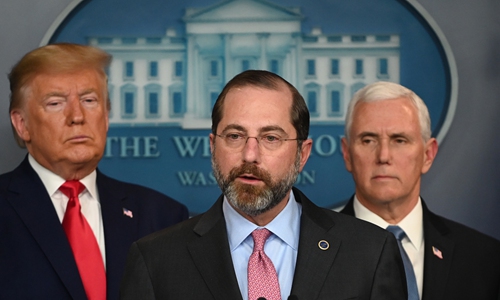HOME >> OPINION
Gap between rich and poor in US laid bare in face of virus
By Li Qingqing Source:Global Times Published: 2020/3/2 23:08:40

Health and Human Services Secretary Alex Azar (center) speaks during a press conference on the COVID-19 outbreak as US President Donald Trump (left) and US Vice President Mike Pence look on at the White House in Washington, DC on Sunday. Photo: AFP
COVID-19 is spreading worldwide, and many countries are facing a big test of their governance systems and ability. The US is also facing the threat of the epidemic, and the most worrying situation in the country is that of the poor. The epidemic shows the world the widening gap between the rich and poor in the US.
Some Americans like to compare the US system with those of other countries. These people tend to describe how other systems are inferior to theirs, as if the US system is the standard in the world. But what really tests a country's system? It is whether the government has the ability to let all people receive equal and timely assistance.
Due to the expensive healthcare system in the US, many people cannot afford even to pay for a test for COVID-19, not to mention the cost of treatment after diagnosis.
According to a report from the Miami Herald on February 24, a man received a notice from his insurance company about a claim for $3,270 two weeks after he got tested for COVID-19. The man was responsible for $1,440 of that bill due to his limited insurance. If low-income Americans are unfortunately infected but are unable to pay the cost of getting tested and thus cannot receive effective treatment, it will be a great blow to US' efforts to prevent and control the epidemic.
And yet some US politicians have turned a blind eye to these basic facts. They instead focus on attacking China's system. But China's treatment for patients diagnosed with the COVID-19 is free. Then how come the US, as the largest economy worldwide, cannot let all of its citizens access to affordable medical services?
Likewise, the US acts as a world leader in science and technology, and US biotech firm Moderna said that the vaccine for the novel coronavirus could be tested on human volunteers in trials by the end of April.
But US Secretary Alex Azar refused to promise that the vaccine would be affordable for everyone even if there is available vaccine in the future. Is such an attitude appropriate for a responsible government?
The expensive healthcare system, the increasingly politicizing of the epidemic due to partisan politics in the US and the CDC's slow testing for the virus have increased American people's anxiety. Many Americans are reportedly hoarding food, flu therapy and pain killers amid the coronavirus threat. Panic, once it spreads, may cause no less damage to a society than a virus. If a superpower fails to control COVID-19 simply because many people cannot afford treatment, then can that country really be great again?
Currently, many Western media and experts are judging China's system through China's epidemic prevention. In fact, countries are also closely watching how the US will react next and observing the US system, because it provides us a chance to compare.
This is a test of the US system, and it remains to be seen whether the country can adjust its policies in time. Based on China's experience, we want to kindly remind the US that more attention should be paid to the poor. The epidemic is a challenge faced by all human beings and hollow bragging about its own system cannot help the US overcome the difficulties.
Posted in: OBSERVER